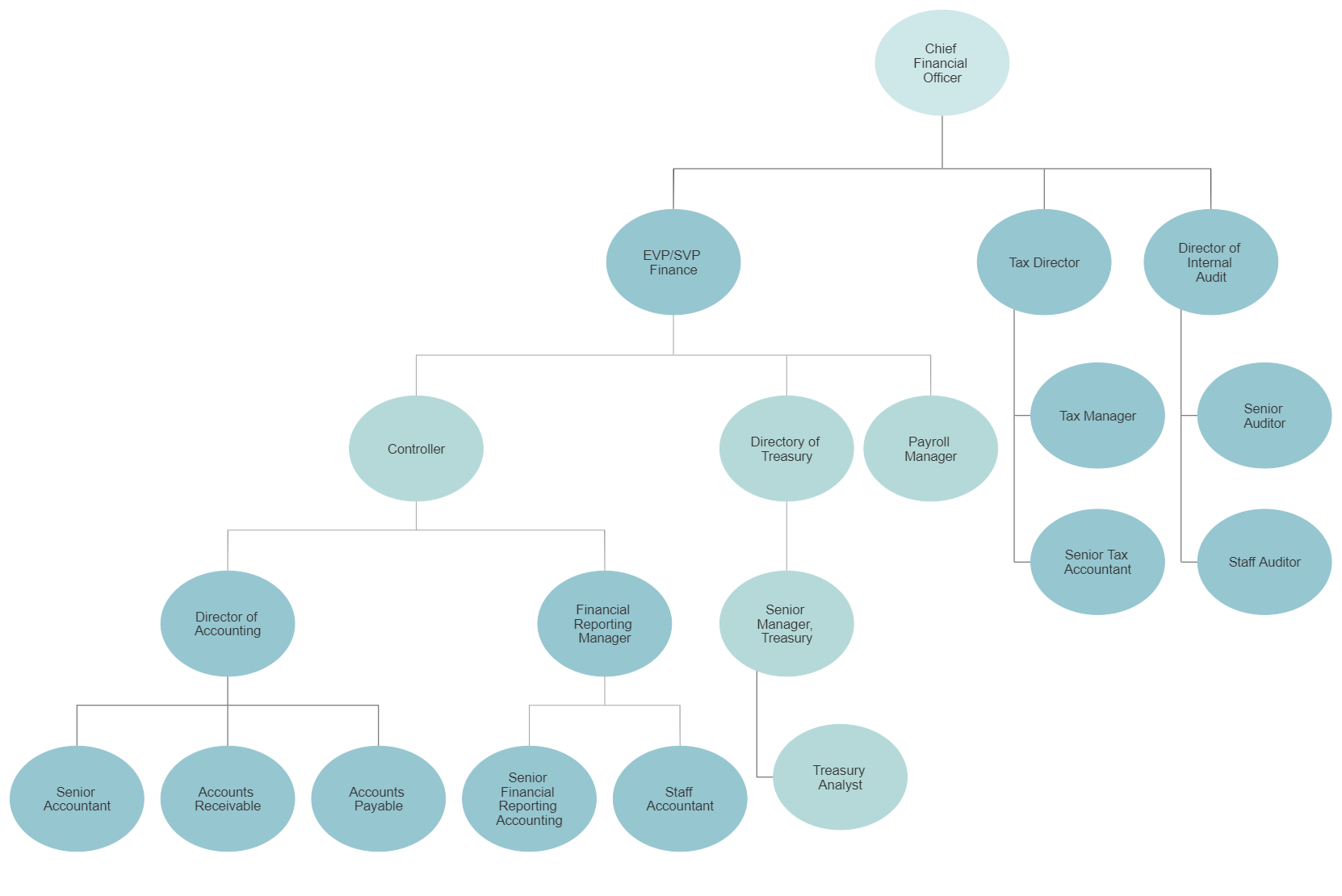
For many business leaders, deciding how to start, grow, or scale a Finance department may be a mystery. They may wonder what size and shape it needs to take, especially in respect to the life stage of their business. In order to ensure both daily operations are maintained and long-term goals achieved, defining a finance organization structure is crucial.
According to Jennifer Martinez, Director of Finance Recruiting at Orion Talent, "It’s important to understand short and long-term needs when building a finance team so that you can identify, assess, and retain the right talent. What phase is the company in? What skills are needed in the department immediately, and to support longer-term initiatives? What about company culture? How have technical and behavioral skills been evaluated, and have these methods been effective?"
How are most Finance Departments Structured?
A Finance department manages a business’s monetary operations and strategy, both long-term and on a daily basis. It is led by the Chief Financial Officer (CFO), EVP/SVP of Finance, or Director of Finance, and often includes the following sub-departments:
Accounts Payable (AP): Ensures all company vendors are paid in full and on time
Accounts Receivable (AR): Collects payments from customers or clients
Accounting & Reporting: Maintains a company's books; prepares all financial statements, reports to U.S. Securities and Exchange Commission
Budgeting & Forecasting: Produces and assesses a company's budget by calculating the variance between planned and actual costs; provides strategic guidance to the business by advising on the financial impact of operational decisions
Expense Management: Responsible for monitoring and auditing all employee-initiated expenses
Internal Audit & Compliance: Oversees a business' financial operations to ensure that they are in line with internal and external policies and regulations
Tax: Manages all tax-related expenses
Treasury Management: Manages all of the company's assets to maximize liquidity and reduce risk
Payroll: Administers and documents all salaries, wages, bonuses, and deductions received by employees
How should corporate and startup companies differ in their approach?
Different companies in different stages often approach creating or growing their finance department in different ways. Are they a corporate giant or a start-up business?
Often, for more established companies, Finance roles are more clearly defined in terms of job descriptions and organizational instructions. For more senior roles, they may look to internal hiring for the experience that person may have gained through various finance roles within the company.
At a startup, however, some employees may work outside of their main positions and they may hire external finance experts along the way. At this life stage, a finance department usually consists of two or three levels.
What roles can be outsourced?
While it was often unheard of to outsource Finance roles due to security risks and potential data loss, there are a few roles that are commonly outsourced today due to advances in Information Security. These include:
- Bookkeeping
- Payroll Processing
- Accounts Payable Specialist
- Accounts Receivable Specialist
- Financial Administration
- Taxes
What roles need to be in-house?
Any roles not listed above are best kept in-house for a variety of reasons. No company wants to lose sensitive data, confidentiality, or management control. They can also avoid unexpected costs and the need for quality control of an outside vendor.
Grow Your Finance and Accounting Department
As you can see, ensuring that you have the ideal finance department structure is important. You need to answer the questions posed above to help determine what sub-departments and positions make the most sense, and whether to outsource any or keep them all in-house.
No matter where you are in developing a finance department structure, Orion Talent is here to help. If you need to hire industry-experienced talent for Finance and Accounting roles, visit us online to learn more.
First time considering finance recruiting? Learn about How to Work with a Finance Recruitment Agency to attract top talent.
Archives
- February 2026
- January 2026
- December 2025
- November 2025
- October 2025
- September 2025
- August 2025
- July 2025
- June 2025
- May 2025
- April 2025
- March 2025
- February 2025
- October 2024
- May 2024
- March 2024
- February 2024
- January 2024
- December 2023
- November 2023
- October 2023
- September 2023
- August 2023
- July 2023
- June 2023
- May 2023
- April 2023
- March 2023
- February 2023
- January 2023
- December 2022
- November 2022
- October 2022
- September 2022
- August 2022
- July 2022
- June 2022
- May 2022
- April 2022
- March 2022
- February 2022
- January 2022
- December 2021
- November 2021
- October 2021
- September 2021
- August 2021
- July 2021
- June 2021
- May 2021
- April 2021
- March 2021
- February 2021
- January 2021
- December 2020
- November 2020
- October 2020
- September 2020
- August 2020
- July 2020
- June 2020
- May 2020
- April 2020
- March 2020
- February 2020
- January 2020
- December 2019
- November 2019
- October 2019
- September 2019
- August 2019
- July 2019
- June 2019
- May 2019
- April 2019
- March 2019
- February 2019
- January 2019
- December 2018
- November 2018
- October 2018
- September 2018
- August 2018
- July 2018
- June 2018
- May 2018
- April 2018
- March 2018
- February 2018
- January 2018
- December 2017
- November 2017
- October 2017
- September 2017
- August 2017
- July 2017
- June 2017
- May 2017
- March 2017
- February 2017
- January 2017
 RSS Feed
RSS Feed





















